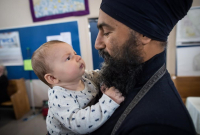Support strong Canadian climate journalism for 2025
Critics of NDP Leader Jagmeet Singh say his performance in a weekend TV interview is a sign he may not be prepared for the challenges of the election year ahead.
His supporters shrugged it off as an inconsequential moment that only those within the "Ottawa bubble" actually care about.
During an appearance on the political show CTV Question Period, Singh appeared to be unaware of a news story that made a lot of headlines last week.
Singh was asked how he would respond, if elected prime minister, to the recent statement by China's Canadian ambassador Lu Shaye, that Canada and its Western allies' calls for the release of two Canadians detained in China is rooted in "white supremacy."
"Sorry, who accused who of white supremacy?" Singh asked his interviewer. He later told the Toronto Star he didn't hear the initial question. Host Evan Solomon repeated it in full and asked how Singh would have responded if he were prime minister.
"I don't know if there is any evidence of that suggestion," Singh said, then quickly pivoted to talking about U.S. President Donald Trump.
The performance spawned a social-media backlash from NDP supporters and foes alike.
Karl Belanger, the NDP's former national director, said Singh's response to the China question is not a big problem on its own, but he believes these kinds of things can add up. Whether he didn't hear the question properly or he wasn't fully briefed, Belanger thinks Singh should have been able to handle it better.
"Frankly, it's not helpful to have answered the way he answered because it feeds into a narrative that Jagmeet Singh is not ready to play at the same level as the other main party leaders," Belanger said.
Singh, elected the NDP leader about 15 months ago, is in the political fight of his life as he seeks to win a seat in the House of Commons for the first time. He is currently devoting almost all his time to that campaign ahead of the Feb. 25 vote but has said even if he doesn't win he will continue to lead the party into next fall's general election.
British Columbia NDP MP Peter Julian, who has been canvassing the riding alongside his leader, said Burnaby voters like Singh because, compared to the candidates from other parties, he has a lot to say on the issues that are most important to people in the riding, like housing affordability, the Trans Mountain pipeline expansion and education.
"We're certainly seeing, both with the phone calls we're making and the door to door, very strong support," said Julian, who insisted he's heard absolutely nothing about Singh's response on the China question.
"It's just not something that people are talking about in Burnaby South and that's, I think, indicative as well of the difference between the kind of issues that are talked about in the Ottawa bubble and the types of issues that people are actually talking about."
Belanger said Singh absolutely has to win the byelection.
"Failure is not an option. Despite what some might say, he must win if he wants to remain leader and lead the NDP in the next general election," he said.
Nationally the NDP is at around 16-per-cent support in polls, which supporters argue is good by historical standards.
One party insider, who spoke on condition of anonymity, acknowledged there's pressure on Singh, but said there were times in the NDP's history when it would have "kill(ed) to be hovering around 16 per cent."
However the NDP hasn't polled that low in an election since 2004, when it won just 19 seats, fewer than half the 44 seats won in 2015.
The insider said the party expects more people to tune in as the October general election gets closer. They're also confident Singh is going to take the Burnaby South seat, which NDP candidate Kennedy Stewart won by just over 500 votes in the 2015 election. Singh is running against Liberal candidate Karen Wang and Conservative hopeful Jay Shin. The Greens have decided not to field a candidate.





Comments